Unit 8 Chinese New Year 复习课件(知识梳理+典例精练)(共28张PPT)
文档属性
| 名称 | Unit 8 Chinese New Year 复习课件(知识梳理+典例精练)(共28张PPT) | 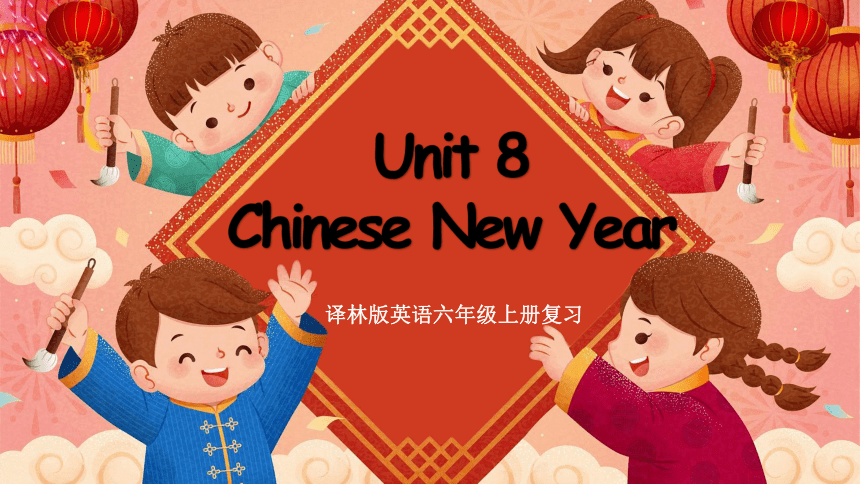 | |
| 格式 | pptx | ||
| 文件大小 | 6.3MB | ||
| 资源类型 | 试卷 | ||
| 版本资源 | 牛津译林版 | ||
| 科目 | 英语 | ||
| 更新时间 | 2024-10-18 09:31:22 | ||
图片预览

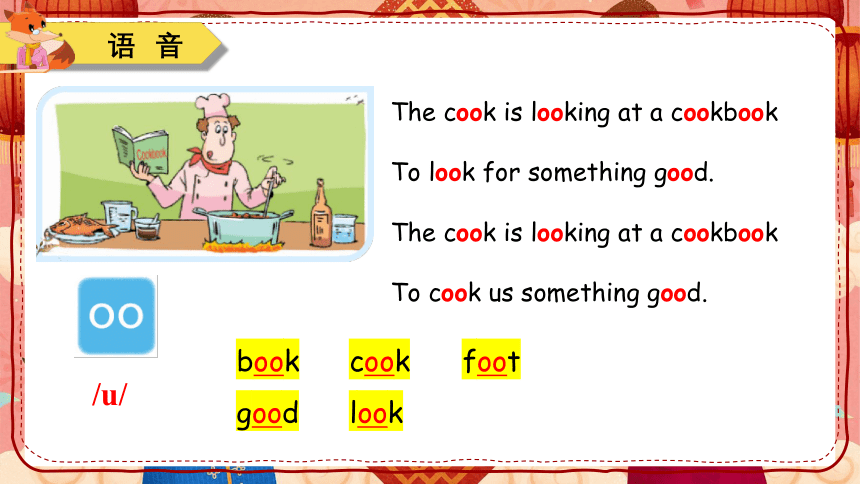


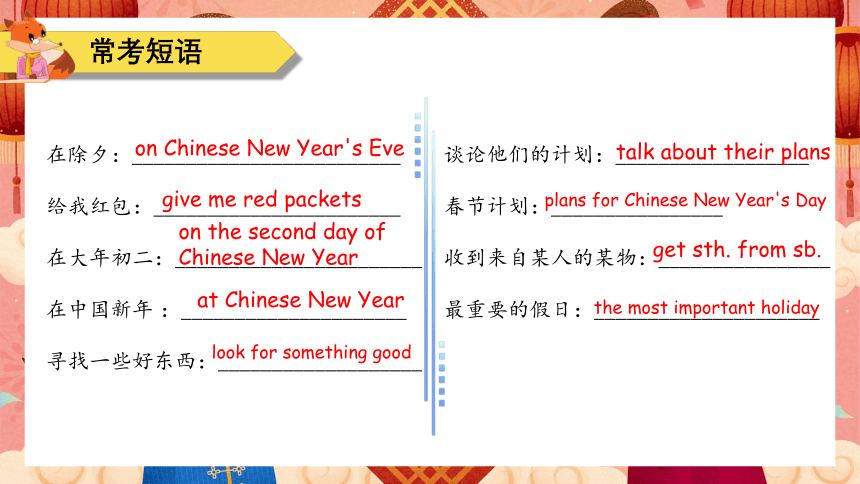

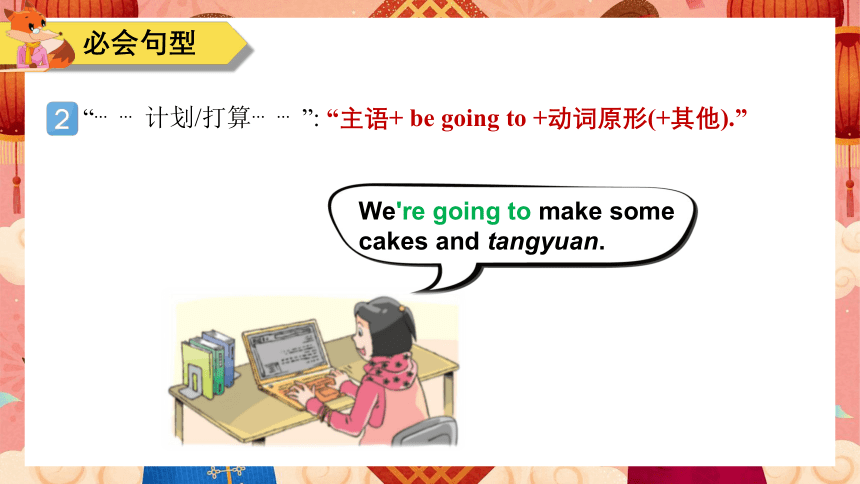
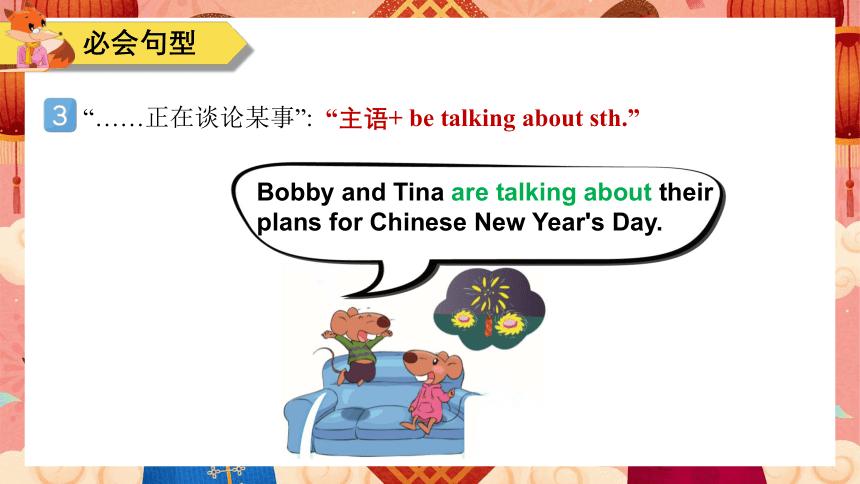
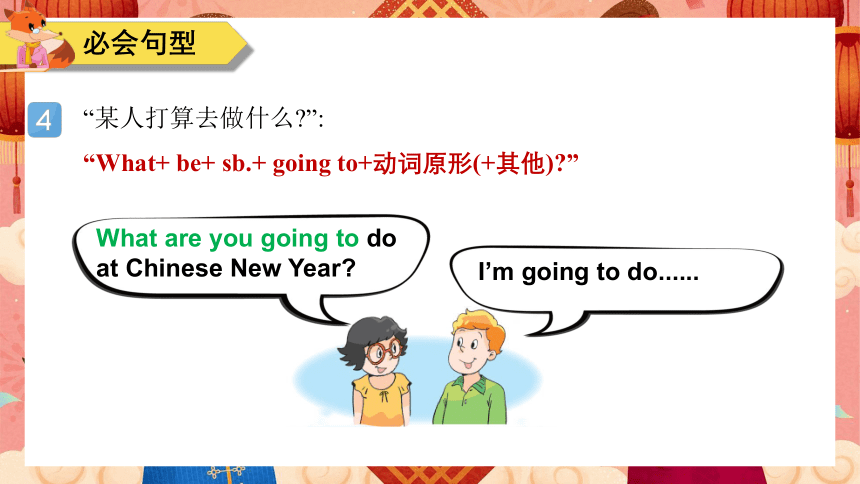
文档简介
(共28张PPT)
Unit 8
Chinese New Year
译林版英语六年级上册复习
The cook is looking at a cookbook
To look for something good.
The cook is looking at a cookbook
To cook us something good.
语 音
/u/
book cook foot
good look
收到,接到:_____________
食物,食品:_____________
★三会:
计划,打算:_______________
富有的,有钱的:___________
get
food
plan
rich
必记单词
★四会:
鞭炮:___________________
点燃:____________________
汤圆:_______________
烟花表演:________________
好极了:________________
firecracker
light
tangyuan
fireworks
hooray
下周:_____________
买些花:_____________
得到红包:_______________
煮饺子:________________
看烟花表演:_______________
在香港:__________________
放鞭炮:________________
制作汤圆:________________
看舞狮:_____________________
收到一封电子邮件:______________
next week
buy some flowers
get red packets
in Hong Kong
light firecrackers
cook jiaozi
make tangyuan
常考短语
watch fireworks
watch a lion dance
get an email
在除夕:_________________________
给我红包:_______________________
在大年初二:_______________________
在中国新年 :_____________________
寻找一些好东西:___________________
谈论他们的计划:__________________
春节计划:________________
收到来自某人的某物:________________
最重要的假日:_____________________
on Chinese New Year's Eve
give me red packets
on the second day of
Chinese New Year
talk about their plans
plans for Chinese New Year's Day
at Chinese New Year
get sth. from sb.
常考短语
look for something good
the most important holiday
用进行时表示将来的句型:
“… be coming.”
必会句型
Chinese New Year is coming.
必会句型
“ 计划/打算 ”: “主语+ be going to +动词原形(+其他).”
We're going to make some cakes and tangyuan.
必会句型
“……正在谈论某事”: “主语+ be talking about sth.”
Bobby and Tina are talking about their plans for Chinese New Year's Day.
必会句型
“某人打算去做什么 ”:
“What+ be+ sb.+ going to+动词原形(+其他) ”
What are you going to do at Chinese New Year
I’m going to do......
核心语法
1.一般将来时: 表示将要发生的动作或存在的状态及打算、计划或决定要做的事情。
肯定句: 主语+ be going to+动词原形+其他.
否定句: 主语+ be + not+ going to+动词原形+其他.
一般疑问句: Be+主语+ going to+动词原形+其他
特殊疑问句: 特殊疑问词+ be+主语+ going to +动词原形+其他
2.表示时间的介词。
考 点 速 记
一般将来时的用法
考点 1
原文:It’s going to be Chinese New Year next week. 下周将是中国的新年了。
My parents and I are going to buy some new clothes and food. 我的父母和我打算买一些新衣服和食物。
一、概念
be going to 表示将要发生的动作或存在的状态,是一般将来时的表达形式之一, 它侧重表 示“计划、安排”的含义,也可表示推测将要发生的事情, 后接动词原形。
注意:此结构中的 be动词要随着主语人称的变化而变化。
二、时间标志词
tomorrow, next week...
三、句型结构
四、be going to 和 will的区别:
1. be going to 表示将要发生的事情, will 表示的时间则较远一些。
He is going to write a letter tonight.他今晚打算写封信。
He will write a book one day.总有一天他会写一本书。
2. be going to 表示根据主观判断推测将来要发生的事情, will表示客观上势必发生的事情。
Look at the dark clouds. It's going to rain.看乌云,马上要下雨了。
He will be twenty years old.他将要二十岁了。
注意: be going to和 will在含义和用法上稍有不同。 be going to往往表示事先经过考虑的打算; will多表示意愿、决心。两者有时不能互换。
提分练
are going to buy
going to watch
are
buy
isn't going to make
will finish
提分练
is going to be
make
coming
are
to have
are going to buy
提分练
C
C
C
提分练
A
A
C
提分练
A
C
B
A
提分练
A. Yes, they are.
B. We're going to the zoo.
C. Wow, that sounds good.
D. I'm going to play football.
C
D
A
B
提分练
2
4
3
6
5
1
7
考 点 速 记
表示时间的介词
考点 2
原文:On Chinese New Years Day, my parents are going to give me red packets.
在中国新年那天,我的父母会给我红包。
时间介词是表示时间的介词。
小学阶段常用的时间介词有: in, on, at, before, after, from, for等。
1. in常与表示月份、季节、年份的词或与上午、下午、晚上等词连用。
如: in 2024 在2024年 in autumn在秋天
in the morning / afternoon / evening 在上午/下午/晚上
2. on常与星期几、具体的某一天或具体某一天的上午、下午、晚上等连用。
如: on Monday在星期一 on June 10th 在6月10日
3. at用于表示在具体某一时刻,表示在某个节日有时也可用 at,也常用于一些固定短语中。
如: at twelve o’ clock在十二点钟 at Spring Festival在春节
at night在夜晚 at weekends在周末
4. before用来表示某动作发生在某时间之前,意为“在······之前”。
如: I usually finish my homework before eight o'clock.
我通常在八点钟前完成家庭作业。
5. after用来表示某动作发生在某时间之后,意为“在······之后”。
如: My mother likes walking after dinner.我妈妈喜欢晚饭后散步。
6. from用来表示某动作从某时间开始,常与 to构成短语“ from ... to...”,意为“从······到······”。
如: We go to school from Monday to Friday.
7. for表示一段时间。
如: My parents are going to stay there for three years.
提分练
on
in
at
before
from
to
提分练
A
C
B
提分练
B
C
A
谢谢
Thank you!
Unit 8
Chinese New Year
译林版英语六年级上册复习
The cook is looking at a cookbook
To look for something good.
The cook is looking at a cookbook
To cook us something good.
语 音
/u/
book cook foot
good look
收到,接到:_____________
食物,食品:_____________
★三会:
计划,打算:_______________
富有的,有钱的:___________
get
food
plan
rich
必记单词
★四会:
鞭炮:___________________
点燃:____________________
汤圆:_______________
烟花表演:________________
好极了:________________
firecracker
light
tangyuan
fireworks
hooray
下周:_____________
买些花:_____________
得到红包:_______________
煮饺子:________________
看烟花表演:_______________
在香港:__________________
放鞭炮:________________
制作汤圆:________________
看舞狮:_____________________
收到一封电子邮件:______________
next week
buy some flowers
get red packets
in Hong Kong
light firecrackers
cook jiaozi
make tangyuan
常考短语
watch fireworks
watch a lion dance
get an email
在除夕:_________________________
给我红包:_______________________
在大年初二:_______________________
在中国新年 :_____________________
寻找一些好东西:___________________
谈论他们的计划:__________________
春节计划:________________
收到来自某人的某物:________________
最重要的假日:_____________________
on Chinese New Year's Eve
give me red packets
on the second day of
Chinese New Year
talk about their plans
plans for Chinese New Year's Day
at Chinese New Year
get sth. from sb.
常考短语
look for something good
the most important holiday
用进行时表示将来的句型:
“… be coming.”
必会句型
Chinese New Year is coming.
必会句型
“ 计划/打算 ”: “主语+ be going to +动词原形(+其他).”
We're going to make some cakes and tangyuan.
必会句型
“……正在谈论某事”: “主语+ be talking about sth.”
Bobby and Tina are talking about their plans for Chinese New Year's Day.
必会句型
“某人打算去做什么 ”:
“What+ be+ sb.+ going to+动词原形(+其他) ”
What are you going to do at Chinese New Year
I’m going to do......
核心语法
1.一般将来时: 表示将要发生的动作或存在的状态及打算、计划或决定要做的事情。
肯定句: 主语+ be going to+动词原形+其他.
否定句: 主语+ be + not+ going to+动词原形+其他.
一般疑问句: Be+主语+ going to+动词原形+其他
特殊疑问句: 特殊疑问词+ be+主语+ going to +动词原形+其他
2.表示时间的介词。
考 点 速 记
一般将来时的用法
考点 1
原文:It’s going to be Chinese New Year next week. 下周将是中国的新年了。
My parents and I are going to buy some new clothes and food. 我的父母和我打算买一些新衣服和食物。
一、概念
be going to 表示将要发生的动作或存在的状态,是一般将来时的表达形式之一, 它侧重表 示“计划、安排”的含义,也可表示推测将要发生的事情, 后接动词原形。
注意:此结构中的 be动词要随着主语人称的变化而变化。
二、时间标志词
tomorrow, next week...
三、句型结构
四、be going to 和 will的区别:
1. be going to 表示将要发生的事情, will 表示的时间则较远一些。
He is going to write a letter tonight.他今晚打算写封信。
He will write a book one day.总有一天他会写一本书。
2. be going to 表示根据主观判断推测将来要发生的事情, will表示客观上势必发生的事情。
Look at the dark clouds. It's going to rain.看乌云,马上要下雨了。
He will be twenty years old.他将要二十岁了。
注意: be going to和 will在含义和用法上稍有不同。 be going to往往表示事先经过考虑的打算; will多表示意愿、决心。两者有时不能互换。
提分练
are going to buy
going to watch
are
buy
isn't going to make
will finish
提分练
is going to be
make
coming
are
to have
are going to buy
提分练
C
C
C
提分练
A
A
C
提分练
A
C
B
A
提分练
A. Yes, they are.
B. We're going to the zoo.
C. Wow, that sounds good.
D. I'm going to play football.
C
D
A
B
提分练
2
4
3
6
5
1
7
考 点 速 记
表示时间的介词
考点 2
原文:On Chinese New Years Day, my parents are going to give me red packets.
在中国新年那天,我的父母会给我红包。
时间介词是表示时间的介词。
小学阶段常用的时间介词有: in, on, at, before, after, from, for等。
1. in常与表示月份、季节、年份的词或与上午、下午、晚上等词连用。
如: in 2024 在2024年 in autumn在秋天
in the morning / afternoon / evening 在上午/下午/晚上
2. on常与星期几、具体的某一天或具体某一天的上午、下午、晚上等连用。
如: on Monday在星期一 on June 10th 在6月10日
3. at用于表示在具体某一时刻,表示在某个节日有时也可用 at,也常用于一些固定短语中。
如: at twelve o’ clock在十二点钟 at Spring Festival在春节
at night在夜晚 at weekends在周末
4. before用来表示某动作发生在某时间之前,意为“在······之前”。
如: I usually finish my homework before eight o'clock.
我通常在八点钟前完成家庭作业。
5. after用来表示某动作发生在某时间之后,意为“在······之后”。
如: My mother likes walking after dinner.我妈妈喜欢晚饭后散步。
6. from用来表示某动作从某时间开始,常与 to构成短语“ from ... to...”,意为“从······到······”。
如: We go to school from Monday to Friday.
7. for表示一段时间。
如: My parents are going to stay there for three years.
提分练
on
in
at
before
from
to
提分练
A
C
B
提分练
B
C
A
谢谢
Thank you!
